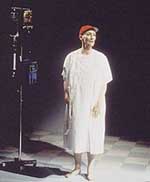
Can a play be made out of the last hours of a professor of literature dying of ovarian cancer? A play that hinges on a close reading of Donne’s Holy Sonnets? That, without slighting its seriousness, sees the comedy in dying? No? Think again: Margaret Edson, with her firstling Wit, has managed it, and more.
Vivian Bearing, Ph.D., is a tough, brilliant, and witty professor of English at an unnamed university. Diagnosed with ovarian cancer in its final stage, she becomes a prized patient at the University Hospital. She is given eight months of intensive chemotherapy, a slim chance of reprieve, and an excellent opportunity to provide medicos with ruthless experimentation. The play is a battle of wits: the dubious know-how of the physicians against the wit (in both the modern sense and the old one of wisdom) of Vivian supported by Donne’s metaphysical poetry.
We meet Vivian Bearing as an inpatient, her hairless head in a red baseball cap, her body in a hospital gown, her feet bare. In and out of bed, she enacts or narrates the battle for life, and the scarcely less scary battle of the Ph.D. vs. the M.D. There is head doctor Kelekian, who might as well be Dr. Overbearing, to whom Vivian Bearing is just a guinea pig. There is his assistant, young Dr. Posner, who once took a course on Donne with Bearing and obtained a hard-won A-minus. But the humanities have left him with scant respect for humanity, buried under the inhumanities of medicine. And then there is nurse Susie Monahan, a well-meaning airhead. Asked whether a shot is a soporific, she replies, “I don’t know about that, but it sure makes you sleep.” Yet it is she who redeems the hospital gang from total lack of empathy.
For example, inpatient Bearing is routinely questioned by Dr. Posner: “What do you do for exercise?” Answer, “Pace.” “Are you having sexual relations?” Answer, “Not at the moment.” And so on. She reflects, “Having a former student give you a pelvic exam was thoroughly degrading.” And further: “I wish I had given him an A.” But Wit is about a lot more. About academia, both students and teachers, including such purblind scholars as Dr. Ashford, whose research assistant Vivian once was. About fathers and daughters. About the profound difference between having and not having a sense of humor. About the not unprofound one between can and may. About the consolations of a life dedicated to the study of poetry.
And about something greater yet. In his Fifth Prebend Sermon, Donne says, “Though there be a difference between timor and terror fear and terror, yet the difference is not so great but that both may befall a good man.” Wit may not provide an airtight answer to the fear of dying, but it does arm you against the terror of hospitals and their torturers. It is a dazzling and humane play you will remember till your dying day, and especially then, thanks also to a near-flawless production.
First, Kathleen Chalfant, a Vivian of power and vulnerability, commanding intelligence and compelling irony. Visualize the dedication of an actress shaving her head for a role, not to mention further heroism I won’t reveal here. Imagine overwhelming effects by the subtlest vocal emphases or a roll of the eyeballs. Picture a perfect amalgam of armored intellect and naked feeling. When Chalfant gallantly removes her cap, her glabrous head radiates a glorious halo. And, last but not least, she does not, like most people, mispronounce the word joust.
Add a supporting cast in which all, and Alec Phoenix in particular, shine; lighting by Michael Chybowski to stir the soul; sparing but bone-chilling sound by David Van Tieghem; capital direction by Derek Anson Jones, etc., etc. And don’t miss the final irony: Margaret Edson teaches elementary school in Atlanta. For this play alone, she should be handed the Harvard English department.
MCC Theater, 120 West 28th Street, (212) 727-7765.